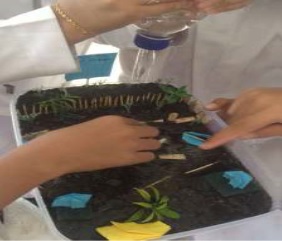
Enhancing Science Process Skills through Conceptual Teaching and Learning Related to Water-Savings and Natural Events Concept
Abstract
Keywords
Full Text:
PDFReferences
Chen, H., Wang, H., Lu, Y. & Hong, Z. (2019). Bridging the Gender Gap of Children’s Engagement in Learning Science and Argumentation Through a Modified Argument-Driven Inquiry. International Journal of Science and Mathematics Education 17, 635–655. doi:10.1007/s10763-018-9896-9
Glynn, S. M., & Winter, L. K. (2004). Contextual teaching and learning of science in Elementary Schools. Journal of Elementary Science Education, 16(2), 51–63.
Harlen, W. (1999). Purposes and procedures for assessing science process skills. Assessment in Education: Principles, Policy & Practice. Taylor Francis Online, 6(1), 129–144.
Hermita, N. (2008). Penerapan Model Pembelajaran Inkuiri Terbimbing Untuk meningkatkan Pemahaman Konsep dan Keterampilan Proses Sains Siswa SD. Thesis. No published.
Hudson, C. C, Whisler V. R. (2007). Contextual Teaching and Learning for Practitioners. Valdosta: Valdosta State University
Jhonson. (2007). Contextual teaching and learning. Bandung: MLC
Karsli, F. Sahin C. (2009). Developing worksheet based on science process skills: Factors Affecting Solubility. Asia-Pacific Forum on Science Learning and Teaching. 10(1).
Malik A, Setiawan A, Suhandi A, Permanasari A, Samsudin A, Safitri D, Lisdian S, Sapriadil S, & Hermita N. (2018). Using hot lab to increase pre-service physics teacher’s critical thinking skills related to the topic of RLC circuit. Journal of Physics: Conference Series. (Online).
Meltzer, E. D. (2002). The Relationship between Mathematics Preparation and Conceptual Learning Gains in Physics: A Posible “Hidden Variable” in diagnostic pretest scores. American Association of physics Teachers, Vol. 70, 1259-1268.
Nashon, S. M., & Madera, E. K. (2013). Instrument for Assessing Disposition for Contextual Learning of Science of Students in East Africa. SAGE Open, 3(3).
Padilla, M. J., Okey, J. R., & Garrard, K. (1984). The effects of instruction on integrated science process skill achievement. Journal of Research in Science Teaching, 21(3), 277–287.
Piaget, J. (1988). Between Action and Mind. Jakarta: PT. Gramedia.
Roth, W.-M., & Roychudhury, A. (1993). The Development of science process skills in authentic contexts. Journal of Research in Science Training, 127-152.
Semiawan, C. (1992). Pendekatan Keterampilan Proses : Bagaimana Mengaktifkan Siswa dalam Belajar. Jakarta: Grasindo.
Supardi. (2013). Aplikasi statistika dalam penelitian konsep statistika yang lebih komperehensif. Jakarta: Change Publication.
Tani, R. W, Putra, M. J. A, & Marhadi, H. (2018). Collaborative reflection to enhance teachers’ teaching ability utilized inquiry model. Journal of Teaching and Learning in Elementary Education (JTLEE),1(2) .(Online).
Yerdelen, S. & Sungur, S. (2019). Multilevel Investigation of students’ Self-regulation Processes in Learning Science: Classroom Learning Environment and Teacher Effectiveness. International Journal of Science and Mathematics Education 17: 89. https://doi.org/10.1007/s10763-018-9921-z
Zulirfan, Rahmad, M., Yennita., Nina Kurnia., & Muhammad Sofyan Hadi. (2018). Science process skills and attitudes toward science of lower secondary students of Merbau Island: A Preliminary Study on the Development of Maritime Based Contextual Science Learning Media. Journal of Educational Sciences, 2(2), 90-99.
DOI: http://dx.doi.org/10.31258/jes.4.1.p.146-152
Refbacks
- There are currently no refbacks.
Copyright (c) 2020 Neni Hermita, Mahmud Alpusari, Eva Astuti Mulyani, Anggi Paura, Herliana Herliana

This work is licensed under a Creative Commons Attribution 4.0 International License.
Publisher: FKIP Universitas Riau












